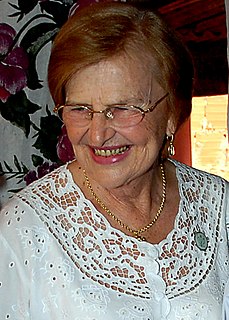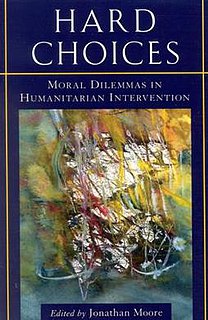Related Research Articles

The International Rescue Committee (IRC) is a global humanitarian aid, relief, and development nongovernmental organization. Founded in 1933 as the International Relief Association, at the request of Albert Einstein, and changing its name in 1942 after amalgamating with the similar Emergency Rescue Committee, the IRC provides emergency aid and long-term assistance to refugees and those displaced by war, persecution, or natural disaster. The IRC is currently working in about 40 countries and 26 U.S. cities where it resettles refugees and helps them become self-sufficient. It focuses mainly on health, education, economic wellbeing, power, and safety.

Humanitarian aid is material and logistic assistance to people who need help. It is usually short-term help until the long-term help by the government and other institutions replaces it. Among the people in need are the homeless, refugees, and victims of natural disasters, wars, and famines. Humanitarian relief efforts are provided for humanitarian purposes and include natural disasters and man-made disasters. The primary objective of humanitarian aid is to save lives, alleviate suffering, and maintain human dignity. It may, therefore, be distinguished from development aid, which seeks to address the underlying socioeconomic factors which may have led to a crisis or emergency. There is a debate on linking humanitarian aid and development efforts, which was reinforced by the World Humanitarian Summit in 2016. However, the conflation is viewed critically by practitioners.
The Save the Children Fund, commonly known as Save the Children, was established in the United Kingdom in 1919 to improve the lives of children through better education, health care, and economic opportunities, as well as providing emergency aid in natural disasters, war, and other conflicts. After passing a century, which it celebrated in 2019, it is now a global movement made up of 30 national member organizations which work in 120 countries.
World Vision International is an evangelical Christian humanitarian aid, development, and advocacy organization. It prefers to present itself as interdenominational and also employs staff from non-evangelical Christian denominations. It was founded in 1950 by Robert Pierce as a service organization to meet the emergency needs of missionaries. In 1975, development work was added to World Vision's objectives. It is active in more than 90 countries with a total revenue including grants, product and foreign donations of USD 2.90 billion (2019).

Andrew S. Natsios is an American public servant and Republican politician from Massachusetts, who served in a number of positions in the administrations of Governor Paul Cellucci and President of the United States George W. Bush.

Dadaab is a semi-arid town in Garissa County, Kenya. It is the site of a UNHCR base hosting 223,420 registered refugees and asylum seekers in three camps as of 13 May 2019, making it the third-largest such complex in the world. The center is run by the United Nations High Commissioner for Refugees, and its operations are financed by foreign donors. In 2013, UNHCR, the governments of Kenya and Somalia signed a tripartite agreement facilitating the repatriation of Somali refugees at the complex.
ActionAid is an international non-governmental organization whose stated primary aim is to work against poverty and injustice worldwide.
Operation Provide Relief was part of a United Nations-endorsed initiative called the Unified Task Force (UNITAF) to secure and facilitate the delivery of humanitarian relief during the Somali Civil War. This effort was assisted by the UNOSOM I mission, in light of a severe food crisis initiated and exacerbated by ongoing factional fighting. The operation was spearheaded by the United States and other troop-contributing Western nations. However, most of the relief supplies were looted by militants shortly upon arrival. This prompted the UN to pass Resolution 794, which paved the way for the more robust, multinational Operation Restore Hope.

Development aid is a type of foreign/international/overseas aid given by governments and other agencies to support the economic, environmental, social, and political development of developing countries. Closely-related concepts include: developmental aid, development assistance, official development assistance (ODA), development policy, development cooperation and technical assistance. It is distinguished from humanitarian aid by aiming at a sustained improvement in the conditions in a developing country, rather than short-term relief. Development aid is thus widely seen as a major way to meet Sustainable Development Goal 1 for the developing nations.

In international relations, aid is – from the perspective of governments – a voluntary transfer of resources from one country to another.

Turkish Red Crescent is the largest humanitarian organization in Turkey and is part of the International Red Cross and Red Crescent Movement.

Operation USA is a non profit humanitarian organization supporting health, education and relief programs at home and abroad in order to help children and families recover and thrive in the wake of disasters. Working with grassroots community organizations, OpUSA strives to help the most overlooked and under-served communities. It is exclusively privately funded, receiving no assistance from the United States federal government. OPUSA had a revenue of over $2.6 million in fiscal year 2019, and since 1979 has delivered more than $400 million in aid to 100 countries.

The humanitarian responses by non-governmental organizations to the 2010 Haiti earthquake included many organisations, such as international, religious, and regionally based NGOs, which immediately pledged support in the aftermath of the 2010 Haiti earthquake. Besides a large multi-contingency contribution by national governments, NGOs contributed significantly to both on-the-ground rescue efforts and external solicitation of aid for the rescue efforts.

Occurring between July 2011 and mid-2012, a severe drought affected the entire East African region. Said to be "the worst in 60 years", the drought caused a severe food crisis across Somalia, Djibouti, Ethiopia and Kenya that threatened the livelihood of 9.5 million people. Many refugees from southern Somalia fled to neighboring Kenya and Ethiopia, where crowded, unsanitary conditions together with severe malnutrition led to a large number of deaths. Other countries in East Africa, including Sudan, South Sudan and parts of Uganda, were also affected by a food crisis.
Matthew Bryden is a Canadian political analyst active in the Horn of Africa. He worked for several aid and political organizations in Somalia after spending some time in the region during his leave from the Canadian military in 1987. He served as the Coordinator for the Monitoring Group Eritrea (EMG) from 2008-2012. He is now a Director at Sahan Research, a think tank based in Nairobi.
Adeso is Nairobi-based humanitarian non-governmental organization.

Once known as Qatar Charitable Society, Qatar Charity is a humanitarian and development non-governmental organization in the Middle East. It was founded in 1992 in response to the thousands of children who were made orphans by the Afghanistan war and while orphans still remain a priority cause in the organization's work with more than 150,000 sponsored orphans, it has now expanded its fields of action to include six humanitarian fields and seven development fields.
Michael Maren is an American journalist, screenwriter, and director. He spent seventeen years as a foreign correspondent based in Africa, writing for The Village Voice, Newsweek, The New Republic, Harper's, GQ, The New York Times Magazine, among others. His book about his experiences in Somalia, titled The Road to Hell (1997), was called "the seminal critique of foreign aid" by The New Yorker. In 2012 he wrote and directed his first feature film, A Short History of Decay. His newest feature film, Shriver, is due to be released in 2022.

Hard Choices: Moral Dilemmas in Humanitarian Intervention is a non-fiction compilation book about humanitarianism on the international arena, edited by Jonathan Moore. Noteworthy contributors to the book include: Kofi A. Annan, Rony Brauman, Romeo A. Dallaire, Richard J. Goldstone, J. Bryan Hehir, Michael Ignatieff, Ian Martin, Elizabeth Reid, Mohamed Sahnoun, Mu Sochua, Cornelio Sommaruga, Roger Williamson, and José Zalaquett. It was published in paperback format by Rowman & Littlefield in 1998.
References
- ↑ "Thefreemanonline.org". www.thefreemanonline.org. Retrieved 2019-01-30.
- ↑ "World Hunger Notes--The Road to Hell: The Ravaging Effects of Foreign Aid International Charity by Michael Maren". www.worldhunger.org. Archived from the original on 2000-01-18.
- ↑ S Knack (2004), Does foreign aid promote democracy?, International Studies Quarterly, archived from the original on 2013-01-05